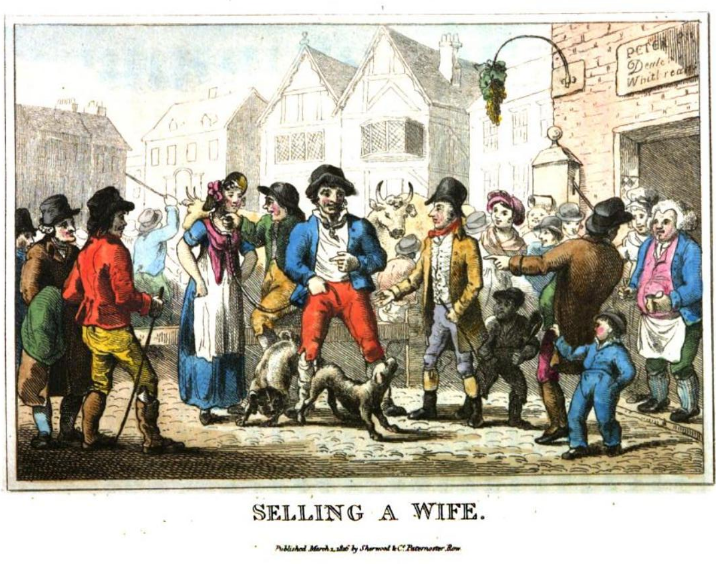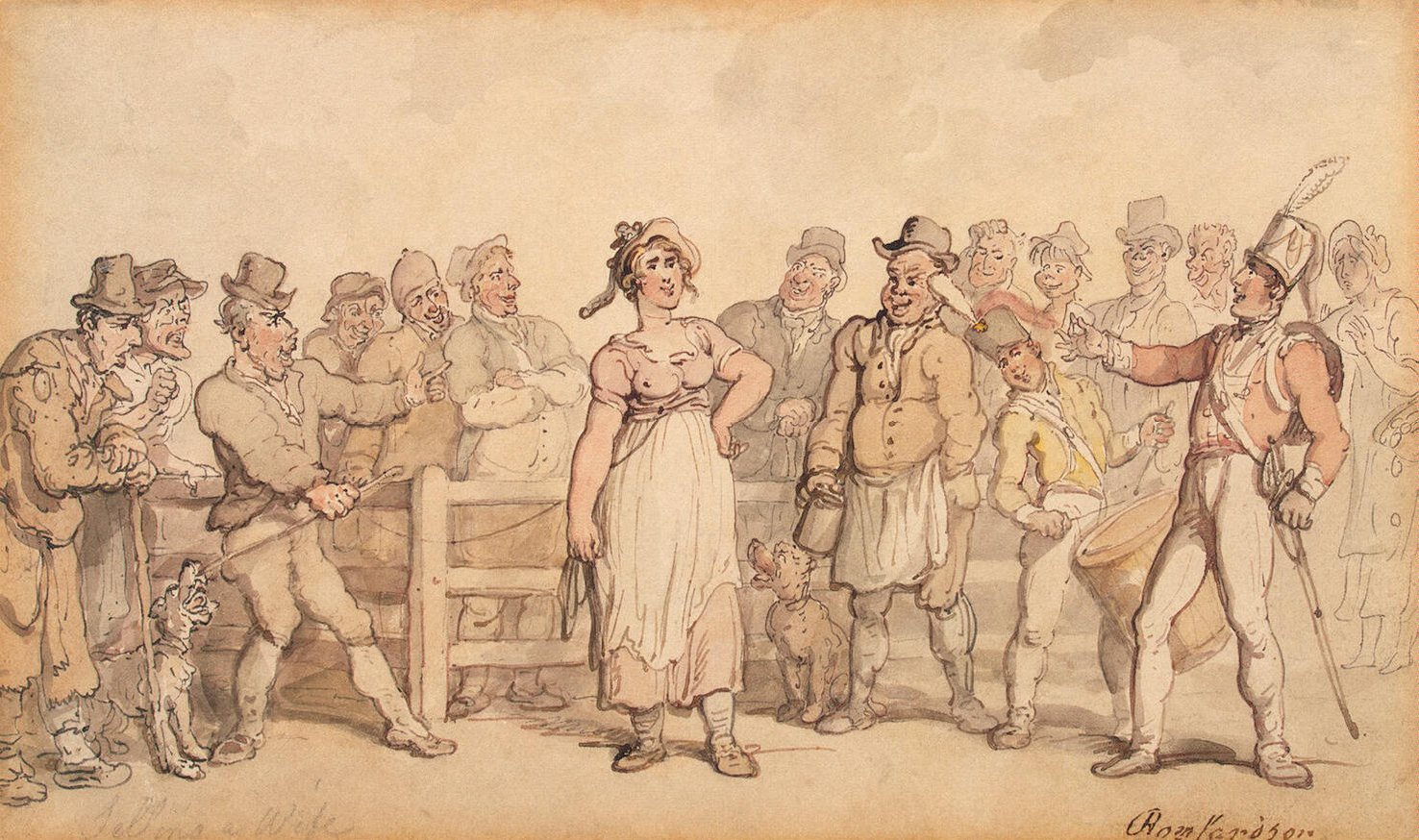Wife Selling, Wife Auctioning, English Custom 17th -19th Centuries; Worldwide
Last edited Wed Apr 7, 2021, 03:58 PM - Edit history (1)

- Selling a wife to the highest bidder, Thos. Hardy's 'Mayor of Casterbridge,' 19th c. English novel.
_________
'English Men Once Sold Their Wives Instead of Getting Divorced,' History, Aug. 22, 2018. Between the 17th and 19th centuries, wife-selling was a weird custom with a practical purpose.
George Wray tied a halter around his wife’s waist and headed to the nearest market. He wasn’t there to buy anything—he was there to sell his wife. Onlookers shouted as he auctioned her off to the highest bidder, William Harwood. After Harwood turned over a single shilling to Wray, he put his arm around his purchase. “Harwood walked off arm in arm with his smiling bargain, ”reported an onlooker, “with as much coolness as if he had purchased a new coat or hat.” It was 1847, and Wray had just gotten the equivalent of a divorce. The scene sounds like an elaborate joke. In reality, it was anything but. Between the 17th and 19th centuries, divorce was prohibitively expensive. So some lower-class British people didn’t get them—they sold their wives instead.
The custom seems outlandish today, but it could be found in public places like markets, taverns and fairs. Historians disagree on when or how the custom started and how widespread it was, but it seems to have been an accepted alternative divorce among lower-class Britons. Wife sales were crude and funny, but they also served a very real purpose since it was so hard to get a divorce. If your marriage broke up in the 1750s, you had to obtain a private Act of Parliament—essentially, an exception to Britain’s draconian divorce law—to formally divorce. The process was expensive and time-consuming, so wife-selling arose as a form of faux divorce. It wasn’t technically legal, but the way it unfolded in public made it valid in the eyes of many. People could simply abandon one another, but a woman who entered into relationships with other people were in constant danger of their previous husband swooping in to punish her new lover and get some money in the process.

- Wife Selling, by Thomas Rowlandson, 1812-14.
Legally, her husband could demand that his wife’s lover pay him a large amount of money for having sexual relations with his wife, a right she lacked since courts didn’t allow wives to sue their husbands for adultery. Wife sales were a way to sidestep that risk. Oddly enough, the sales took on the form of cattle auctions of the time. After announcing the sale, the man would put a ribbon or a rope around his wife’s neck, arm or waist and lead her to “market” (either an actual market or another public place). Then, he’d auction her off, often after declaring her virtues to the onlookers. Once she was purchased by another man, the previous marriage was considered null and void and the new buyer was financially responsible for his new wife.
Usually, wife sales were merely symbolic—there was just one bidder, the woman’s new lover. Sometimes there wasn’t a designated buyer, though, and an actual bidding war broke out. Men could announce a wife sale without informing their wife, and she might be bid on by total strangers. But women had to agree to the sale. It would seem that the woman was at a disadvantage during a wife sale, but that wasn’t always the case. Since she was still married to her first husband under the law, he was technically entitled to all of her possessions (at the time, married women’s property all belonged to their husbands). The public nature of the sale, though, made it clear to one and all that the seller gave up his right to his former wife’s possessions. And the woman also sidestepped the very real threat of having her new lover sued by her first husband for “criminal conversation.”...
More, https://www.history.com/news/england-divorce-18th-century-wife-auction
_____________
- Wife Selling, https://en.wikipedia.org/wiki/Wife_selling
- England, Main article: Wife selling (English custom).. The English custom of wife selling spread to Wales, Scotland, Australia, and the United States before dying out in the early 20th century...
- United States, For divorce-based instances from the colonies before they became the U.S., see wife selling (English custom). In 1781, in South Carolina, a "Bill of Sale" of a "Wife and Property" for "Two Dollars and half Dozen Bowls of Grogg", the buyer "to have my said Wife for ever and a Day," is, according to Richard B. Morris, "unique of its kind"...
.. Wife selling has been found in many societies over many centuries and occasionally into modern times, including the U.S. (including in Hawaii among the Japanese, among Indians in the Gallinomero, Yurok, Carolina, and Florida tribes and in the Pacific Northwest, and among natives on Kodiak Island in what is now Alaska), Colombia, England, Australia (among aborigines), Denmark (possibly), Hungary, France, Germany, India, Japan, Malaya (among Chinese laborers), Thailand (at least permitted), Northern Asia (among the Samoyads), Asia Minor (among the Yourouk), Kafiristan, Indonesia (albeit not outright), Tanganyika, Congo, Bamum, Central Africa (among the Baluba), Zambia, South Africa (among Chinese laborers), Burkina Faso, Ethiopia, Nigeria (possibly), Abyssinia, Egypt, Lombardy, ancient Rome (sometimes as a legal fiction and sometimes as actual), ancient Greece, and ancient Emar (of Syria).
In Rwanda, it was the subject of a wartime accusation. Specific bans existed in Thailand, Indonesia, ancient Rome, and ancient Israel and partial bans existed in England and Japan. Wife sale was a topic of popular culture in India, the U.S., China, Scandinavia, Nepal, Guatemala, and the Dutch Indies. It has been found in Christianity and Judaism...
no_hypocrisy
(54,575 posts)Does anyone know if this slipped into any of his novels?
appalachiablue
(43,942 posts)of orphans in 'Oliver Twist' I think, and he surely knew about wife selling. Good question.
In the main article link above there's an illustration of Thomas Hardy's book, 'The Mayor of Casterbridge' with a wife selling scene.
The strange English custom spread to Wales, America, Australia and is present worldwide, see Wiki above.
50 Shades Of Blue
(11,345 posts)It's been a long time since I read that book so I can't remember the details other than the character who became a mayor had much earlier auctioned off his wife and daughter.
appalachiablue
(43,942 posts)of 'wife selling' from Hardy's 'Mayor of Casterbridge.'

50 Shades Of Blue
(11,345 posts)after the couple had had a fight. It was a spur of the moment thing and he regretted it after he sobered up, and tried to find his wife. But it was too late, she was gone with her new "husband."
appalachiablue
(43,942 posts)when Edward Windsor took on Wallis Simpson, he paid her husband some amount. The English custom that spread to Wales, Australia, and the US was phased out in the early 20th c. according to Wiki.
Delmette2.0
(4,480 posts)Response to appalachiablue (Reply #6)
Delmette2.0 This message was self-deleted by its author.
niyad
(130,513 posts)What???? You did not think they are actually human, did you????
Would you consider cross-posting this in Women's Rights And Issues? Thanks in advance.
appalachiablue
(43,942 posts)muriel_volestrangler
(105,837 posts)A many-greats-grandfather of mine "bought" Anne - her surname (either at birth or by marriage) is apparently unreadable in the parish record in London, which lists the baptism of their daughter as:
5 August 1708 Anne the natural daughter of Granado Chester by Anne ... wife of ... she cohabiting with the said Chester incontinent as being sold by her said husband to Chester to common fame
The younger Anne died within the year, and the mother Anne died in 1714. Later that year Granado married (he was born in 1675), and I'm descended from that family.
The Chester family was reasonably well off (enough to leave wills); Granado's father was a grocer in London, and he inherited the business.
appalachiablue
(43,942 posts)things never really change. I've heard of destitute people selling their kids in the 20th c., mainly Germans after the war.
ETA, One time when we were in college and having dinner in a popular, crowded restaurant, my dad was a bit high and said, 'does anybody want to marry my daughters?' He meant it in a half joking, half serious way but my step sister who was about 15 was furious; those two didn't get along.
RussBLib
(10,464 posts)but you still got miles to go
Not that long ago, customs that now seem fucking ridiculous.
